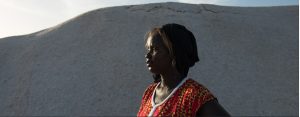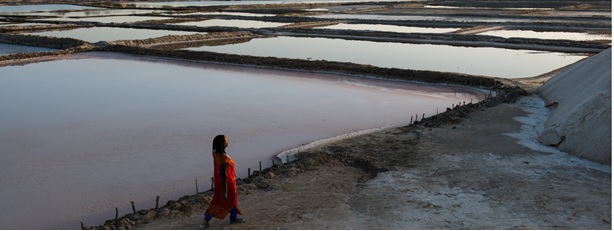By Eliza Mackintosh, CNN, Photographs by Sarah Tilotta, CNN
Fatick, Senegal — Marie Diouf, 35, is on her cellphone speaking swiftly in Wolof, a lyrical Senegalese language, as salt flies past her.
Dressed in a red boubou, a long traditional robe, Diouf cuts a striking figure in an otherwise muted landscape encrusted in white. As the sun sets, casting an orange hue over the salt flats of Fatick, in southwestern Senegal, Diouf stands, hand on hip, surveying a group of sinewy young men chipping away at a hardened, crystallized mound.
“When I saw other men who had their own land I thought, ‘why not me?'” Diouf said, gesturing across the expansive plains, dotted with ancient baobab trees. In the distance, tucked away in fields of dry maize, is her village Ndiemou, which means “Salt” in the local Serer language.

When Senegal privatized land in the area in 2000, Diouf became the first woman to invest. It was a bold move in the west African country, where women have limited access to property despite providing the vast majority of agricultural labor. During the high harvesting season, from February to April, the salt flats are scattered with hundreds of women toiling away in over 40 degrees Celsius (100 degree Fahrenheit), scooping the crystalline mineral into baskets later carried aloft on their heads. But they’re not necessarily the ones to benefit financially from the production.
Diouf walks along the edge of irrigation pools at her salt flat in Fatick. In the coming months, the water will evaporate, leaving salt behind. It’s an inequity that didn’t sit well with Diouf.
“When I first started, men were telling me that I wasn’t going to last in this business, but I would say to them that every job a man can do, a woman can too.”
Today, she employs dozens of women and men — including her husband — in her own micro-business, producing about four to five tons of salt daily in peak season by extracting water from a nearby river to evaporate on land.
“At home my husband is the boss, but here, in the salt flats, it’s me,” Diouf said, breaking into an infectious laugh.

The same year Diouf leased her plot of land, a presidential decree mandated that all salt harvested in Senegal be iodized. It’s a public health strategy widely considered to be the most effective way to prevent iodine deficiency, which can cause goiter (swollen thyroid glands in the neck), stunted growth and mental impairment — health issues that had long plagued parts of Senegal. And it’s cheap to do — each ton of salt needs about 6 ounces of potassium iodate, which costs only $4.25.
In most developed countries around the world, table salt has been fortified for nearly a century, which is why the concept of iodine deficiency is almost unheard of in places like the United States.
But not here.
Despite being the largest salt producer in West Africa (Senegal mines nearly 500,000 tons annually), iodine deficiency is still a stubborn problem across the country. Experts say that’s down to quality control. Most Senegalese people get their salt from small scale artisanal harvesters, like Diouf, who make up about one-third of the country’s overall production. But many fail to iodize their salt effectively.
Those quality issues are why the Iodine Global Network, Global Alliance for Improved Nutrition and others are pushing for Senegal to pivot from supporting small scale producers to deploying iodized salt industrially instead: in processed foods, condiments and seasonings, such as stock cubes.
Only 37% of Senegalese households have access to adequately iodized salt, according to a 2015 nationwide survey, and the situation is worse in rural areas. For comparison, approximately 70% of all households globally had access in 2013.
And the need for iodine, which is critical to brain development, increases during pregnancy and infancy. In 2015, 30% of pregnant women in Senegal were iodine deficient, according to the same survey. Without the essential nutrient, they risk losing babies in miscarriages, or giving birth to children with permanent neurological damage. Even a slight deficiency can lower a child’s I.Q. by 10 to 15 points.
Read more: The ‘Salt Queen’ working to transform the health of a nation
Source: CNN


